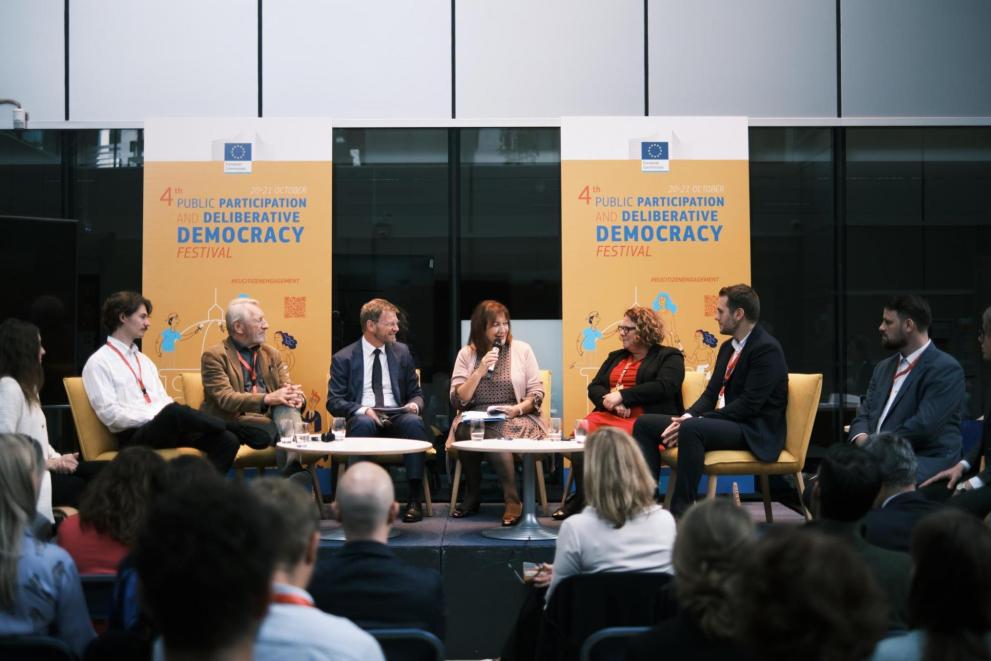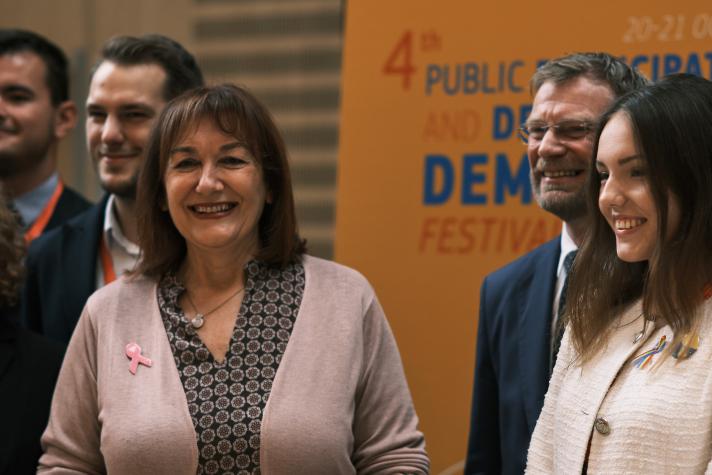
We talked to the Vice-President on the occasion of her participation at the Joint Research Centre’s 4th Public Participation and Deliberative Democracy Festival. We asked her why participatory democracy is important for the Commission, how the Commission is involving citizens in its policymaking and within this what is the role for the Joint Research Centre’s Competence Centre on Participatory and Deliberative Democracy.
You just participated in a session on civic education, discussing its future with citizens from different generations and EU countries. What is your take away?
Indeed, citizens came to this session from Croatia, Denmark and Slovakia to share what they had discussed in intergenerational dialogues about the future of civic education. It was a pleasure to hear the different viewpoints and see the engagement across generations. What I heard reaffirmed my strong conviction that in our schools, academies, universities, we should nurture democratic values, critical thinking and constructive engagement. We need learning environments and curricula that encourages and teaches children to engage in participatory democracy, which help them develop practical citizenship skills. After all, today’s children are tomorrow’s voters. If we want to build resilient democracies, it is important to engage the youngest generation. But, if we think about it, we learn throughout our whole lives. I believe there is space for life-long learning here. Particularly as it is important that citizens can be engaged in their democracy throughout their lives. From 8 to 80. I think that this has been a key message from citizens at this panel today.
I am glad to say that we are now establishing the EU Children’s Participation Platform as a response to calls from young people for closer involvement. This platform will give young people a direct link to EU institutions, allowing them to feed ideas into EU decision-making.
You say that we need to build democratic resilience within the European Union. How do you see the situation of democracy in the today’s world?
Democracies face a number of challenges in many parts of the world. So, I do not think that one panacea exists to address any one of them. But I think that this is, first and foremost, a question of trust. If people feel left behind, if they think that their interests, dreams and concerns are not taken into account when decisions are made, that threatens the foundations of democracy. We must be careful about how this can feed into the extreme positions across the political spectrum and face head-on the authoritarian reflex. There are many books that address the question as to how and why a democracy can die. I believe that democracies die when we stop caring about it. When we don’t engage. So, it is vital that we nurture our democracy – at all levels of governance.
This can be done in a number of ways – including building democratic resilience from within. Who are our greatest assets in our democracy? Who are the key participants in our democracy? They are of course our citizens. Citizens are not objects of democracy. They are participants. We can both nurture and build democratic resilience from within by empowering citizens and developing a European civic identity. This can be achieved by enhancing engagement and participation in democracy, through both education and communication. And we must do this at all levels of governance. Action and engagement at the local, regional and national levels underpin the potential for successful democratic resilience at the EU-level.
A new push for European democracy has been a key priority for our Commission from the start of our mandate. In this effort, we need to narrow the gap between citizens and politicians to bridge the gap. Russia’s aggression against Ukraine made it even more clear that we cannot take our democracies for granted. As President von der Leyen stressed in her State of the Union Speech, we must fight for our democracies every single day.
Do you see any positive developments for democracies?
Of course. As I often say, democracy is the best and there is nothing better. Research shows that citizen participation in public decision-making can build trust and reinforce democracy. By now, I think that this is well understood by many of us and not only in Europe. We see a significant global momentum around citizen engagement, participatory and deliberative democracy. This global Deliberative Wave is marked most strongly by our Conference on the Future of Europe, which followed previous EU efforts and also citizens’ assemblies, juries, and panels in EU member states, for example the Citizens Convention for Climate in France or the Citizens’ Assembly in Ireland.
Since the times of ancient Greece, democracy has always been evolving. Today citizens want to have their say not only at elections, once in every five years, but on a regular basis. They want to be in constant dialogue. Participatory and deliberative democracy methods offer us innovative ways to engage citizens outside of elections, thereby complementing, reinforcing representative democracy.
The Commission is committed to bolster the links between citizens and EU institutions through meaningful participation of citizens in science and policy. At the moment, we focus on following up on the proposals of the Conference by integrating their proposals in the European Commission Work Programme for 2023. At the same time we continue with our efforts to put citizens at the heart of EU policymaking. As President von der Leyen announced in her recent State of the Union speech, citizens’ panels will become a regular feature of our democratic life.
How did we get here? And what are the most important recent developments?
In 2020, we adopted the European Democracy Action Plan, underlining our commitment to participatory and deliberative democracy and setting out measures to build capacity and infrastructure for deliberative civic engagement and political participation.
Then, the Conference on the Future of Europe has provided key insights into how we can enrich our democracy by involving citizens. A central and very successful feature of the Conference were the European Citizens’ Panels, platform and plenary. 800 European citizens were chosen into four panels, through random selection, but also in a way to reflect the European Union’s rich diversity in nationality, urban or rural life, gender, age, socioeconomic background and level of education. Discussions in the panels were then presented by representatives of the panels and debated in the Conference’s Plenary. In the plenary, citizens, many of them younger than 25, sat and deliberated European public matters together with members of the European and national parliaments, representatives of EU Member States and others. It was a truly innovative forum for deliberation.
This strong and close involvement of citizens in the Conference demonstrated very clearly that European politics is changing, that we are setting the infrastructure to make our democracies more participatory to narrow the gap between citizens and politicians.
After the Conference, we published a Communication in which we commit to run citizens’ panels ahead of certain key policy proposals. In the State of the Union speech, President von der Leyen underlined this commitment again. And it is very much reflected in our new Work Programme for 2023, which foresees a new generation of citizens’ panels to deliberate on initiatives on food waste, learning mobility and virtual worlds. These panels will constitute another major step towards mainstreaming citizens’ engagement in our policy cycles.
Where can we see citizens’ engaged already in European policies?
There are several very good examples on closer involvement of citizens in EU policymaking. One is EU Missions, within the Horizon Europe research and innovation programme. EU Missions engages citizens among others to transform cities together with them, to make cities climate resilient and neutral. Another example is EU Cohesion Policy, which aims to support regions and cities to develop participatory and deliberative infrastructure. One concreate example here is the piloting of deliberative democracy processes in EU regions, in Cantabria and Bologna in Italy.
Simultaneously, the Commission is committed to ensuring the transparency and legitimacy of the EU policymaking process. Stakeholders and the public can provide input throughout the whole policy cycle online via the Have Your Say consultation platform. This platform will be upgraded to bring together all citizens’ engagement mechanisms of the Commission.
In addition, 2022 marked the 10th anniversary of the European Citizens’ Initiative. Since mid-September 2021, the Commission has registered ten new European Citizens’ Initiatives, calling for EU action in areas ranging from improved working conditions in the garment sector to the taxation of green products and more animal rights.
This is of course just some of the forward-looking examples that we have. Our work builds on years of experience of citizens’ dialogues and other formats of engagement. Looking ahead we want see more and more involvement of citizens across policies, while also providing clear follow-up and feedback in response to their engagement. It is all part of building a true innovative ecosystem for democratic innovation. Democracy itself is not static so we too, politicians and institutions, must be capable of adapting and changing to respond to citizens needs.
What role do you see for the Commission’s Competence Centre on Participatory and Deliberative Democracy run by the Joint Research Centre within these changes?
The demand for capacity support and expert advice for participatory and deliberative projects will grow more and more as the Commission and other EU institutions involve citizens more in EU policies. This is where the Commission’s Competence Centre run by the Joint Research Centre has a crucial role. The Centre, launched in October 2021, builds on 30 years of work that has been carried out on citizen engagement, participatory and deliberative democracy. It functions as a hub of knowledge and expert advice to train and help others who are new in this field, but are about to launch or are in the process of a citizen engagement project.
What I appreciate a lot, is that the Centre is not an ivory tower that operates in isolation. Rather, it functions as one of the centres of a dense European and global network of activists, experts, policymakers, researchers and others who work on deliberative democracy and on engaging citizens in policymaking and science. In addition, the Centre also leads innovative projects, like the BiodiverCities pilot programme, which sets concreate examples for others. So, the Centre not only preaches participatory democracy, but leads by example, much like how the Commission and the EU sets an example in Europe and on the global scene.
BiodiverCities is a pilot programme of the European Parliament, run by the JRC and DG Environment to enhance civil society participation and foster urban biodiversity. In what way does BiodiverCities set an example?
I strongly believe that the role of local governments, local politicians is essential to narrow the gap between politicians and citizens, so that we increase social trust and strengthen the resilience of our democracies. Earlier in my political career, I was the mayor of Dubrovnik, a city on the Adriatic Coast in Croatia. I know from experience the strong connection that municipalities have to their citizens. We should leverage this connection in our work.
The BiodiverCities project is a good step in the right direction, as it aims to strengthen the participation of citizens and civil society in local and urban decision-making. I think that some of the stories from the 10 towns and cities across Europe where the pilot took place are very encouraging. They show that even in rural areas which otherwise struggle with major demographic and economic challenges, it is possible to engage citizens in massive numbers to shape public decisions together and raise hopes for the future. It is possible of course if there is local will and outside support in terms of capacity building and resources.
Let’s look towards the future before we conclude. What is next on citizen’s engagement and deliberative democracy at the Commission?
Well, we talked about a lot of aspects already. One key event that we did not mention is the Second US Summit for Democracy in 2023. Here, together with Ireland, the Commission is co-leading the cohort on Deliberative Democracy and Citizens Assemblies. I am glad that a growing number of international organisations and governments are looking at deliberative democracy and meaningful citizen engagement as a way to strengthen democracies. We have many experiences to share and are of course looking forward to benefit from the perspectives of others. If we learn from each other that will help to strengthen the resilience of our democracies wherever our democracies might be across the globe.
Details
- Publication date
- 25 October 2022
- Author
- Joint Research Centre
- JRC portfolios
Contacts
Competence Centre on Participatory and Deliberative Democracy
Get in touch and subscribe to our newsletter.
- Name
- Competence Centre on Participatory and Deliberative Democracy
- Website
- https://cop-demos.jrc.ec.europa.eu/events/4th-public-participation-and-delibera…
- EU-CITIZEN-ENGAGEMENT
 ec [dot] europa [dot] eu
ec [dot] europa [dot] eu






